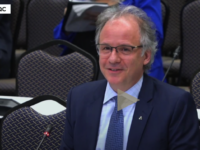The CRTC’s Bill C-11 hearings are in their third and final week as a steady stream of broadcasters and producers make their way to Gatineau to urge the Commission to force Internet streamers to hand over cash in a giant cross-industry subsidy scheme designed to support everyone from small producers to Bell’s news division. As the witnesses take turns seeking the mantle that they are facing the biggest crisis (even as there is record film and television production in Canada and broadcasters stand to be the biggest beneficiary of the Online News Act), there has been practically no interest or discussion of the risks to consumers and competition that could come from significant new regulatory costs.
I set out to change that yesterday in my appearance before the Commission. It was my first time to appear as a witness before the CRTC and I used the opportunity to emphasize the real risks of reduced competition and higher costs that can come with mandated payments that exceed global standards. Further, I argued that the Commission should not establish interim payments at all, noting that it was more appropriate to address all of the outstanding Bill C-11 regulatory questions before looking to streamers to start cutting cheques.











